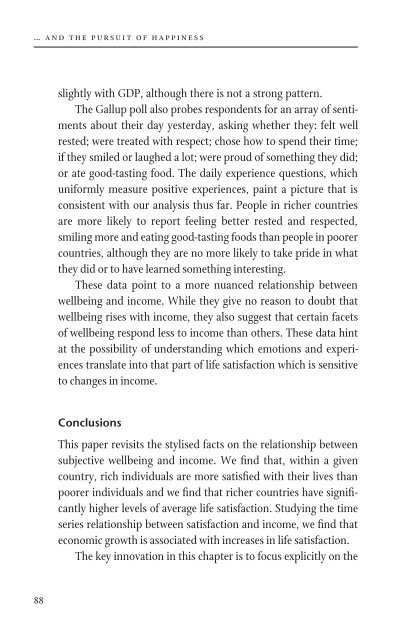… and the Pursuit of Happiness - Institute of Economic Affairs
… and the Pursuit of Happiness - Institute of Economic Affairs
… and the Pursuit of Happiness - Institute of Economic Affairs
Create successful ePaper yourself
Turn your PDF publications into a flip-book with our unique Google optimized e-Paper software.
<strong>…</strong> <strong>and</strong> <strong>the</strong> pursuit <strong>of</strong> happiness<br />
subjective wellbeing<br />
slightly with GDP, although <strong>the</strong>re is not a strong pattern.<br />
The Gallup poll also probes respondents for an array <strong>of</strong> sentiments<br />
about <strong>the</strong>ir day yesterday, asking whe<strong>the</strong>r <strong>the</strong>y: felt well<br />
rested; were treated with respect; chose how to spend <strong>the</strong>ir time;<br />
if <strong>the</strong>y smiled or laughed a lot; were proud <strong>of</strong> something <strong>the</strong>y did;<br />
or ate good-tasting food. The daily experience questions, which<br />
uniformly measure positive experiences, paint a picture that is<br />
consistent with our analysis thus far. People in richer countries<br />
are more likely to report feeling better rested <strong>and</strong> respected,<br />
smiling more <strong>and</strong> eating good-tasting foods than people in poorer<br />
countries, although <strong>the</strong>y are no more likely to take pride in what<br />
<strong>the</strong>y did or to have learned something interesting.<br />
These data point to a more nuanced relationship between<br />
wellbeing <strong>and</strong> income. While <strong>the</strong>y give no reason to doubt that<br />
wellbeing rises with income, <strong>the</strong>y also suggest that certain facets<br />
<strong>of</strong> wellbeing respond less to income than o<strong>the</strong>rs. These data hint<br />
at <strong>the</strong> possibility <strong>of</strong> underst<strong>and</strong>ing which emotions <strong>and</strong> experiences<br />
translate into that part <strong>of</strong> life satisfaction which is sensitive<br />
to changes in income.<br />
Conclusions<br />
This paper revisits <strong>the</strong> stylised facts on <strong>the</strong> relationship between<br />
subjective wellbeing <strong>and</strong> income. We find that, within a given<br />
country, rich individuals are more satisfied with <strong>the</strong>ir lives than<br />
poorer individuals <strong>and</strong> we find that richer countries have significantly<br />
higher levels <strong>of</strong> average life satisfaction. Studying <strong>the</strong> time<br />
series relationship between satisfaction <strong>and</strong> income, we find that<br />
economic growth is associated with increases in life satisfaction.<br />
The key innovation in this chapter is to focus explicitly on <strong>the</strong><br />
magnitude <strong>of</strong> <strong>the</strong> subjective wellbeing–income gradient (ra<strong>the</strong>r<br />
than its statistical significance), while also bringing <strong>the</strong> greatest<br />
quantity <strong>of</strong> data to bear on <strong>the</strong>se questions. We show that <strong>the</strong><br />
within-country, between-country <strong>and</strong> over-time estimates all<br />
point to a quantitatively similar relationship between subjective<br />
wellbeing <strong>and</strong> income. This relationship is robust: we find it not<br />
only at different levels <strong>of</strong> aggregation but using different data<br />
sets. We also find that income is positively associated with o<strong>the</strong>r<br />
measures <strong>of</strong> subjective wellbeing, including happiness as well as<br />
o<strong>the</strong>r upbeat emotions.<br />
The fact that life satisfaction <strong>and</strong> o<strong>the</strong>r measures <strong>of</strong> sub jective<br />
wellbeing rise with income has significant implications for<br />
development economists. First, <strong>and</strong> most importantly, <strong>the</strong>se<br />
findings cast doubt on <strong>the</strong> Easterlin paradox <strong>and</strong> various <strong>the</strong>ories<br />
suggesting that <strong>the</strong>re is no long-term relationship between wellbeing<br />
<strong>and</strong> income growth. Absolute income appears to play a<br />
central role in determining subjective wellbeing. This conclusion<br />
suggests that economists’ traditional interest in economic growth<br />
has not been misplaced. Secondly, our results suggest that differences<br />
in subjective wellbeing over time or across places are likely<br />
to reflect meaningful differences in actual wellbeing.<br />
Subjective wellbeing data <strong>the</strong>refore permit cross-country wellbeing<br />
comparisons without reliance on price indices. As Deaton<br />
(2010) notes, if we wish to use some kind <strong>of</strong> dollar-a-day threshold<br />
to count poverty, <strong>the</strong>n we need price indices that account for<br />
differences in quality <strong>and</strong> in quantity <strong>of</strong> consumption in different<br />
countries. In practice, <strong>the</strong>se are difficult to construct. Instead we<br />
can use wellbeing data. Deaton notes that <strong>the</strong>se comparisons<br />
using wellbeing data are valid only if life satisfaction responds to<br />
absolute ra<strong>the</strong>r than relative wellbeing. If individuals assess <strong>the</strong>ir<br />
88 89












